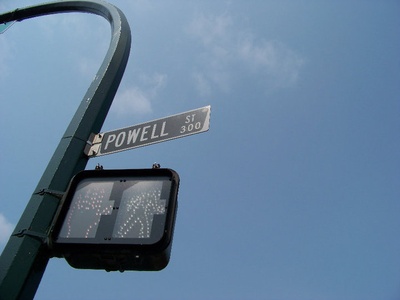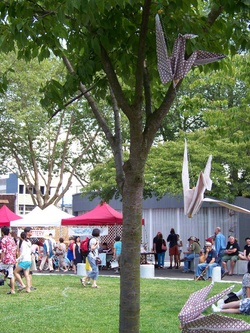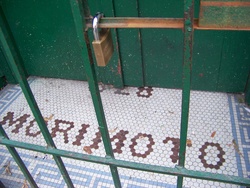It was only supposed to be a one shot deal. Now it is Vancouver’s longest running ethnic festival. And it is at the epicentre of Nikkei exile in Canada. Vancouver’s late Japantown—Powell Street.
Originally staged for the Japanese Canadian centennial in 1977, the Powell Street Festival has become a household name for Vancouver Nikkei. One of the people involved in the hard work from early on is someone that you can still find these days rushing around on festival day: Mayu Takasaki.
The first couple of years were rocky. It was hard for Mayu and Rick Shiomi (the first coordinator responsible for staging the fest) to gain recognition in the community. There weren’t many Nikkei community organizations on board back then.
Mayu and Rick shared coordinating over the first few years, other years when Mayu wasn’t coordinating she was in charge of getting the volunteers. And the festival was ALL volunteer-run.
On whether the location of the festival is important, Mayu says, “Oh, absolutely. Absolutely. Because it’s called the Powell Street Festival. You couldn’t have the Powell Street Festival in Burnaby. You couldn’t have the Powell Street Festival in Champlain Heights.”
Captured in a 1990 interview for a Simon Fraser University joint project with the Japanese Canadian Oral History Project, Mayu defends the location choice against criticism: “There are people who every year come to us and say we should move the festival. Who say that it doesn’t matter where it’s held. That they don’t like the environment. They don’t like the ‘rubby-dubs’. They don’t like the native people in the park. Every year somebody will come and bring that suggestion up—suggest we move it—I don’t know—god knows where. But that park, when I was a kid, was no mans land. There wasn’t a blade of grass growing on the park when I was a kid. Well, when I was very small I can remember going to Obons at the Vancouver Buddhist Church there. But there was a really long period of about 20 years when that park was a huge sand lot. Then because of the Centenial year, and also because of the city’s neighbourhood improvement programs, they upgraded that park. They planted the grass. The seniors at Tonari Gumi planted sakura trees to commemorate the centennial.
There are plaques and commemorative rocks, and all kinds of things in that park. I think that Powell Street was really responsible for bringing life back to that park.”
And what does the area bring to the festival? Well…the entire appeal.
“It holds that historical significance for the Issei and the Nisei. For example, my uncle comes out every year to the festival. Now he grew up in Toronto. But he’s lived in Vancouver now for I guess 15 years (in Steveston). Now he comes to the festival every year not to see any of the performers, not to eat the food, not to buy any of the crafts. He likes wandering around the festival because he knows he will see somebody that he hasn’t seen in a long time. He knows that somewhere along the line, someone from Ontario, or Alberta, or wherever will decide that if they’re gonna come out to the west coast for a holiday, maybe they’ll come during Powell Street. In which case, they’ll come to the festival. And he’ll see them. And he has seen people he hasn’t seen in 30 years. Because although he grew up in Toronto, he was born on Vancouver Island and spent time in Tashme. So it’s those people who knew in Tashme as a child that he hopes to see again. I think that if the festival were held anywhere else, people wouldn’t come back. The festival itself is not what brings them back, I think it’s the possibility of meeting old friends, and it’s coming back to that space, that site that is really important to them.”
“People wil come back and look around the park and comment to me on how it’s changed. How because the new Buddhist church is there, things are different. Or how they used to live in a house just down the street.”
The festival itself brings people together in direct defiance of what we were once told was illegal. It brings people back to where we have been exiled from. It also showcases the diversity of Nikkei talent that you cannot see elsewhere, all in one place. Is this festival radical? Is this festival necessary?
The interviewer asks Mayu, “As a Japanese Canadian Community Festival, I think Powell Street is somewhat unusual in featuring performers that are not mainstream. Why do you think they do it? Do you think that’s true that is uncommon for a community festival to be supporting this kind of performing art and second of all, why do you think it happens at Powell Street and not other places?”
Mayu: “We do present non-mainstream Japanese Canadian or Japanese American peformers. Why other community events don’t do this, is because I think unfortunately most other Japanese Canadian community events are not necessarily geared to the community. I think many events are geared to the outside, to the greater Vancouver community. I think they have an image of what Japanese/Japanese Canadian culture is and that’s what they want to present. That’s what they think the greater community expects of the Japanese community. They expect to see classical odori, they expect to see the tea ceremony. They expect to see martial arts. And that for many people in the Japanese Canadian community, that’s what it is. They still have a difficulty in determining what is Japanese Canadian culture as opposed to what is Japanese culture. I think that they see them being one in the same.”
Important words.
My generation of yonsei has been so severed from Nikkei-ness from over 70 years of direct, malicious attacks on community building, a series of gestures by the federal and several provincial goverenments, municipal policies, and ad hoc citizens campaigns to wipe out Japanese Canadian culture. The Powell Street festival has been perhaps the only thing that works on repairing that severance. An active on-going haven generating new connections, building on our grandparent’s legacy (and honouring them not just in words, but action—the seniors tent with the best seats in the house has always been a fixture) while promoting the future of Nikkei as community, Nikkei as culture and not just as individuals.
This month as been amazing for me in terms of learning about Old School Radical Nikkei-ness, publishing this stuff, connecting with people and seeing it go viral in ways I never dreamed. But it is only memories. And memories alone are not what will ensure the future of Nikkei community and identity. It’s time to make some more noise in the way of the Powell Street Festival (which too, was only supposed to be a one shot deal).
Nikkei, come. We have much work to do.
* This article was originally published on the author’s blog on May 31, 2012.
© 2012 Kenji Tokawa





